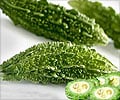- Bitter melons are the best cancer fighters
- Eating bitter melon or bitter gourd (karela) regularly can destroy deadly cancer cells
- Grab a karela a day to keep cancer away
According to recent research, the Asian fruit commonly eaten in India that also is known as bitter melon shows promise in slowing the progression of cancer, which is the world’s second deadliest disease. It has properties that prevent cancer from growing and spreading.
Read More..
“All animal model studies that we’ve conducted are giving us similar results, an approximately 50% reduction in tumor growth,” said Ratna Ray, Ph.D., professor of pathology at Saint Louis University in St. Louis, Missouri. “Our next step is to conduct a pilot study in cancer patients to see if bitter melon has clinical benefits and is a promising additional therapy to current treatments.”
Ray, who received her doctorate degree from the University of Calcutta and grew up in India eating bitter melon, began studying whether the fruit, which is a folk medicine for diabetes, also could protect against cancer.
Goodness of Natural Products
“Natural products play a critical role in the discovery and development of numerous drugs for the treatment of various types of deadly diseases, including cancer. Therefore, the use of natural products as preventive medicine is becoming increasingly important,” Ray said.
Bitter Melons can Prevent Oral Cancer
While it’s too soon to say if bitter melon works to stop cancer in people, Ray eats bitter melon three to four times a week. She compares the taste to the bitterness in beer.
How to Cook Bitter Melons
Bitter melon is available as a green vegetable in local Asian markets. Ray prepares bitter melon in an assortment of ways – steaming it and mashing it with green chilies and a bit of salt or potatoes or stir-frying it with eggplant, squash and greens and seasoning with spices. It also can be blended into a smoothie.
“Some people take an apple a day, and I’d eat a bitter melon a day,” Ray said. “I enjoy the taste.”
References:
- Inhibition of the key metabolic pathways, glycolysis and lipogenesis, of oral cancer by bitter melon extract - (https://doi.org/10.1186/s12964-019-0447-y)
- Bitter Melon Prevents the Development of 4-NQO–Induced Oral Squamous Cell Carcinoma in an Immunocompetent Mouse Model by Modulating Immune Signaling - (https://cancerpreventionresearch.aacrjournals.org/content/early/2018/01/10/1940-6207.CAPR-17-0237)
Source-Newswise













